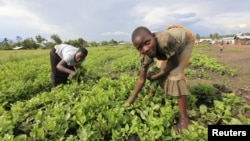KINSHASA —
The Democratic Republic of Congo's government has cut its budget for agriculture, despite a previous pledge to raise it. The DRC's confederation of agricultural producers is protesting the cut, which was agreed to this week in a parliamentary vote on the government budget for 2013.
When he took office in April, Prime Minister Matata Ponyo Mapon told parliament that in the next five years the DRC could halve the number of its citizens living in absolute poverty by boosting its agricultural sector.
At the time, some lawmakers commented that to help make that happen the government ought to boost spending for agriculture and rural development, which were allocated only 3 percent of the budget for 2012.
But instead of boosting that share in 2013, the government has cut it to 1.75 percent, angering the DRC’s national confederation of agricultural producers, CONAPAC.
Paluku Mivimba, the chairman of CONAPAC says his members feel very negative about the budget reduction, which doesn’t meet the expectations of the people and especially of small farmers, nor does it correspond with the president’s wish to make the Congo the granary of Africa.
The government has made some commitments to increasing its spending on agriculture. Along with other regional governments it signed a pledge in 2003 to increase agriculture and rural development’s share of the budget to 10 percent.
Paluku, who is also chairman of a regional network of farmers' groups, says the other governments in the region have made an effort to meet or even exceed that target.He says Burundi now spends around 12 percent of its budget on agriculture, Rwanda more than 10 percent, and Tanzania and Kenya around seven percent.
He also said that to his knowledge, each country in the region defines agriculture and rural development in the same way and that spending on rural roads, for example, is included in rural development budgets in Congo and in the rest of the region.
According to Paluku, the prime minister made a specific pledge to raise spending on agriculture earlier this year.
He says that during the launch of the national agricultural campaign, the prime minister said the government was spending $32 million on the campaign this year and aimed to increase that progressively to $100 million.
In fact, says CONAPAC, even the $32 million hasn’t been spent in a timely fashion.
The agricultural campaign is limping, it’s not going well, says Paluku. He says nothing that was promised, including improved seeds and other material, has been provided in time, and adds that it’s now too late for this campaign.
In his speech defending the budget this week, the prime minister said he hoped to raise the agriculture budget in future.
The government is facing a wave of insurgencies in the east of the country, which has forced it to increase military spending.
When he took office in April, Prime Minister Matata Ponyo Mapon told parliament that in the next five years the DRC could halve the number of its citizens living in absolute poverty by boosting its agricultural sector.
At the time, some lawmakers commented that to help make that happen the government ought to boost spending for agriculture and rural development, which were allocated only 3 percent of the budget for 2012.
But instead of boosting that share in 2013, the government has cut it to 1.75 percent, angering the DRC’s national confederation of agricultural producers, CONAPAC.
Paluku Mivimba, the chairman of CONAPAC says his members feel very negative about the budget reduction, which doesn’t meet the expectations of the people and especially of small farmers, nor does it correspond with the president’s wish to make the Congo the granary of Africa.
The government has made some commitments to increasing its spending on agriculture. Along with other regional governments it signed a pledge in 2003 to increase agriculture and rural development’s share of the budget to 10 percent.
Paluku, who is also chairman of a regional network of farmers' groups, says the other governments in the region have made an effort to meet or even exceed that target.He says Burundi now spends around 12 percent of its budget on agriculture, Rwanda more than 10 percent, and Tanzania and Kenya around seven percent.
He also said that to his knowledge, each country in the region defines agriculture and rural development in the same way and that spending on rural roads, for example, is included in rural development budgets in Congo and in the rest of the region.
According to Paluku, the prime minister made a specific pledge to raise spending on agriculture earlier this year.
He says that during the launch of the national agricultural campaign, the prime minister said the government was spending $32 million on the campaign this year and aimed to increase that progressively to $100 million.
In fact, says CONAPAC, even the $32 million hasn’t been spent in a timely fashion.
The agricultural campaign is limping, it’s not going well, says Paluku. He says nothing that was promised, including improved seeds and other material, has been provided in time, and adds that it’s now too late for this campaign.
In his speech defending the budget this week, the prime minister said he hoped to raise the agriculture budget in future.
The government is facing a wave of insurgencies in the east of the country, which has forced it to increase military spending.




